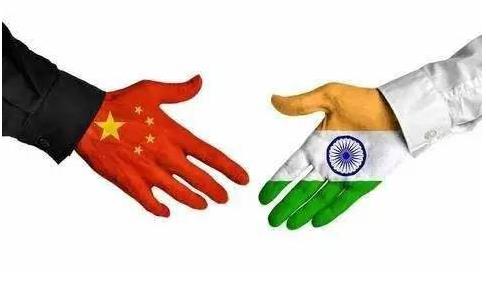
The 21st round of talks between Chinese and Indian special representatives on boundary issues was held in Chengdu, capital of southwest China’s Sichuan Province on Saturday. The press release stated that the meeting reached an important consensus, “the tone of which is positive, constructive and forward-looking.”Public opinion has noticed that compared with previous announcements, which were mostly diplomatic rhetoric, the content of this communiqué is relatively comprehensive and new.
中印边界问题特别代表第21次会晤24日在成都举行。新闻公报称,会晤取得重要共识,“基调积极,富有建设性和前瞻性”。舆论注意到,与过去多是外交辞令类的简短消息相比,这次公报的内容比较多,也比较新。
Obviously, the meeting atmosphere was friendly and led to fruitful results.
显然,会晤氛围不错,也卓有成效。
The Meeting on China-India Boundary Issue was launched in 2003 and has been going on for 15 years, but its overall progress has not been impressive. However, the meeting is of great practical and symbolic significance as it has been aiming to address the most complicated and sensitive border disputes in China-India relations.
中印边界会晤从2003年启动,至今已15年。总体进展不算大。但能把中印关系中最复杂最敏感的边界争端,摆到桌面上来谈,其本身就具有重大的现实及象征意义。
With such a working mechanism, soldiers stationed on the China-India border line would exercise self-restraint when dealing with differences on the frontlines, so as to possibly avoid conflicts, which was absolutely a matter of great importance for two neighboring countries.
有了这样的机制,中印双方的边境士兵在一线处理分歧时也会相对克制些,尽可能避免擦枪走火。 这对两个相邻大国来说,当然非同小可。
The Chengdu meeting was the first China-India boundary negotiations after the border stand-off between the two neighbors and also the first negotiation held after leaders of the two sides met in Wuhan, capital of central China's Hubei Province.
成都会晤是洞朗对峙后的中印首次边界谈判,也是双方领导人在武汉会晤后的首次谈判。
During the tense confrontation of troops in the Dong Lang area, both Indian and Chinese public opinions have voiced radically. Imagine what kind of situation would China-India relations be like today if the two sides really came into fighting? It has been proven that the decision makers in both China and India are strategically calm, which is good for the two countries and the overall region.
洞朗对峙剑拔弩张,印度舆论发出不少过激的声音,中国也有。设想一下当时如果真打起来,今天的中印关系又将是什么样的局面?事实表明,中印两国的决策者在战略上是相当清醒的。这是两国之幸,也是地区之幸。
The interdependence of China and India in areas of economic and trade is not heavy. Culturally, there are existent barriers between the two sides, while they harbor historical animosity against each other. Besides, in reality, they have border disputes. Mutual trust between the two sides is weak, and there are many external forces hoping for China-India conflicts out of various psychological needs. It is conceivable that in this case, China and India are prone to being at logger heads with each other, and their peaceful co-existence in absolute terms is not easy.
中印在经贸上相对依存度一直不算高,文化上有隔阂,历史上有过节,现实中存在边界争端。双方社会的互信薄弱,外界又有很多力量出于不同心理希望中印怼起来。可想而知,在这种情况下,中印很容易闹起矛盾,绝对意义上的和平共处并不容易。
Given the present situation, it is vital for China and India to remain calm and rational. The Indian public opinion has always been more prone to being irritable, which in turn stimulates Chinese public opinion and creates a harmful, negative atmosphere for interactions, inevitably increasing the pressure and cost of rational decision-making by both sides.
因为此,对中印来说,保持冷静和理性至关重要。印度舆论历来比较容易激动,这反过来又会刺激中国舆论,在负向互动中形成有害的氛围,无形中增加了双方理性决策的压力和成本。
It’s not only a matter of whether Chinese and Indian policymakers can remain calm in the face of their direct differences, but also whether these differences can be alleviated among both countries’ soldiers on the border, journalistic circles, and everyone involved in China-India relations.
面对直接分歧时,如何保证头脑不发热,决不仅是中印决策层的事。边境上的士兵,两国的媒体人,以及每一个和中印关系发生联系的人,都该有此认识。
Secondly, China and India always need to insist on independent judgment. This is particularly true in the current external environment of China-India relations, characterized by extreme complication, and due to the subtle influence of both Europe and the United States on China-India relations.
其次,中印需要始终坚持独立判断。尤其当前中印关系的外部环境异常复杂,欧美看待中印的心态都很微妙。
Both China and India are not only big countries, but also developing countries, which are late comers in the current round of modernization. The basic structure of the global discourse power features a “weak East” and a “strong West.” Therefore, Western public opinion is willing and has the ability to shape social cognition of non-Western countries in a subtle way.
中印都是大国,但也都是发展中国家,是这一轮现代化中的后来者。全球话语权的基本结构是西强东弱。西方舆论具备在潜移默化中塑造非西方国家社会认知的意愿和能力。
For example, the so-called theory of “The Chinese Dragon vs. the Indian Elephant,” which was a hot topic in the past few years, was clearly made up by the West. China and India must maintain a high degree of vigilance, abstain from provocations and avoid falling into traps set by others for China and India.
如前些年比较热的所谓“龙象之争”,就是西方炮制出的一个带有明显倾向性的话题。中印要保持高度警惕,不受人挑唆,不掉入他人处心积虑为中印设下的套路。
Thirdly, China and India must have the patience and wisdom to deal with thorny issues. Just like boundary negotiations, China and India have met and talked 21 times in the past 15 years. China and India today have reached an important consensus, but this is merely a preliminary result. Such agreement is still far from realizing the real settlement of their border disputes. There is no urgency of accomplishing the whole work all in one try.
第三,中印要有处理棘手问题的耐心和智慧。就像边界谈判,中印谈了15年21次,在今天进一步达成重要共识,但也只能算一个阶段性的成果,离真正解决边界争端还很遥远。对此不能有毕其功于一役的急迫心理。
To look at China-India relations requires a strategic vision and a future perspective. China and India will achieve mutual benefits and win-win results in all fields, just like seeds invigorated by sunlight and rain and growing rapidly, only if both sides could properly control their direct disputes, strengthen the building of confidence measures, and work to develop bilateral relations at the political level. In such case, we can absolutely expect a future scenario of “the Indian Elephant dancing with the Chinese Dragon.”
看待中印关系要有战略眼光和未来视角。妥善管控住直接争议,加强建设信任措施,在政治层面致力于发展双边关系,中印在各领域的互利共赢,就会像种子被阳光和雨水激活,快速地自然生长。未来的“龙象共舞”完全是可以期待的。
Disclaimer: The author of this article is from the Global Times. The article is published in Chinese on opinion.huanqiu.com. It is translated from Chinese into English and edited by China Military online. The information, ideas or opinions appearing in this article are those of the author and do not reflect the views of eng.chinamil.com.cn. Chinamil.com.cn does not assume any responsibility or liability for the same. If the article carries photographs or images, we do not vouch for their authenticity.
声明:本文作者来自《环球时报》。文章由环球网首发,军网英文编译。文中出现的信息、观点或看法均为作者个人观点,不代表军网英文的观点。本网站不承担任何责任。如果文章含有照片或图像,我们不保证其真实性。













